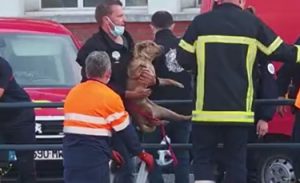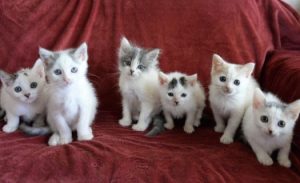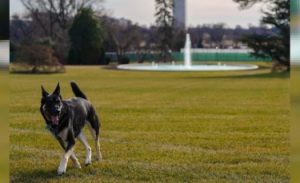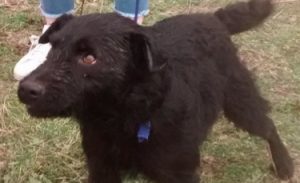Other names: Deerhound, Scottish Deerhound
The Scottish Greyhound is a dog whose appearance is reminiscent of the Greyhound, but with a rough and shaggy coat, larger dimensions and more powerful build. Cut out for speed and endurance, the Scottish Greyhound nonetheless gives off an impression of softness. The gait of the Scottish Greyhound is characterized by frank, easy movements and long strides.
<!–
–>
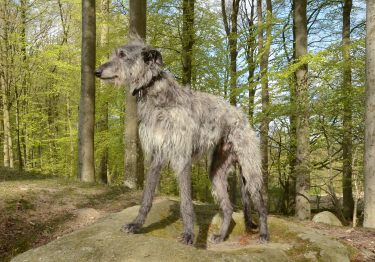
| Long | |
| Britain | |
| Big | |
| Long |
| Sex | Weight | Cut |
|---|---|---|
| Female | From 35 kg to 45 kg | From 68 cm to 80 cm |
| Male | From 35 kg to 45 kg | From 71 cm to 80 cm |
History of the breed
According to some sources, the ancestors of the Scottish Greyhound are dogs brought to the north of the main British island (now Scotland) by Phoenician traders, but the exact origins of this breed remain somewhat unclear. The Scottish Greyhound was traditionally used for red deer hunting in Scotland and England . His physical and behavioral standards have changed very little, except that the Scottish Greyhound is hardly encountered today except as a companion or show dog .
The breed was definitively recognized by the FCI (Fédération Cynologique Internationale) on April 29, 1955. Its official FCI standard in force was published on October 8, 2012.
Scottish Greyhound Pictures
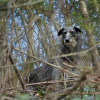
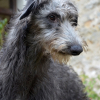
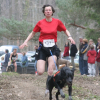
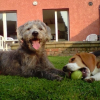
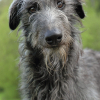
View all Scottish Greyhound photos from Woopets members
Physical features
His hair: shaggy, thick, tight and rough in texture, never woolly. Softer on the head, chest and stomach. Slightly fringed on the inside of the limbs.
Its color: dark blue gray, brindle and yellow, sable or red fawn with black mask and markings (on the ears, ends and tail).
His head: elongated and in harmony with the whole body. The skull is flatter than round, relatively wide between the ears. The stop is not marked at all. The nose is black, the nose slightly aquiline, the muzzle becoming more refined towards the nose, the lips joined together and the jaws strong and articulated in scissors.
His ears: relatively small, folded back, set high and covered with short, soft hair. Raised above the head when the dog is in action.
His eyes: dark in color (brown or hazelnut), displaying a soft expression at rest and piercing on alert.
His body: harmoniously built and strong bones. The neck is very strong, the nape prominent. The top line is never straight. The kidney is well arched and the line of the croup sloping to the attachment of the tail. The chest is taller than it is wide, but not excessively narrow.
Its tail: strong at its attachment, tapering towards its end. Long, almost reaching the ground. Drooping when the dog is at rest, bent but not raised when the dog is in action.
Behavior and character
| Affectionate | |
|---|---|
| Calm | |
| Protective | |
| Independent | |
| Hunter | |
| Barks / howls |
Behavior with others
| Cohabitation with children | |
|---|---|
| Sociable with other animals | |
| Love strangers |
the Scottish Greyhound is as much a hunting and racing dog as it is a companion dog. With a gentle and friendly temperament, he is characterized by great docility coupled with remarkable calm . The Scottish Greyhound is very attached to his master and his family and gets along quite well with children. Even if he is attentive, he is not made for guarding.
The Scottish Greyhound
is it right for you? Take the test!
Education
| Clever | |
|---|---|
| Obedient |
Obedient and always seeking to please his master, the Scottish Greyhound is not a particularly difficult dog to train , on the contrary. With a minimum of firmness, a lot of gentleness and rewards , he quickly learns the rules to follow at home, as well as the behaviors to adopt at work.
Living conditions
| Suitable for apartment living | |
|---|---|
| Good for new masters | |
| Love it hot | |
| Love the cold |
The ideal living environment for a Scottish Greyhound is a house with a large fenced garden . It adapts easily to the city if it is given enough exercise and freedom of movement.
Health
| Solid | |
|---|---|
| Ease of gaining weight |
the Scottish Greyhound is a rustic and resistant dog. However, certain predispositions to diseases are associated with this breed: cardiovascular abnormalities (dilated cardiomyopathy, systemic port shunt), stomach upturn and dilation, osteosarcoma (bone tumor), torsion of the lung or spleen.
Hypoallergenic breed
No
Litter size
Between 4 and 8 puppies
| Major concerns |
|
||||||
| Minor concerns |
|
| Occasional concerns |
|
|
| Suggested tests |
|
To protect you from these risks and insure your companion in the event of health problems, Woopets recommends a Scottish Greyhound dog insurance .

function showAssuranceForm () {var siteReferer = var id_race_association = ”; //console.log(id_race_association);success: function (html) {}});}document.addEventListener (‘DOMContentLoaded’, () => {$ (‘# assuranceModalBanner’). on (‘show.bs.modal’, function (event) {showAssuranceForm ();});});
Life expectancy
Minimum: 10 years
Maximum: 12 years
The life expectancy of a Scottish Greyhound is, on average, between 10 years and 12 years.
Calculate the human age of your Scottish Greyhound!
To choose… 1 year 2 years 3 years Four years 5 years 6 years 7 years 8 years 9 years 10 years 11 years old 12 years 13 years 14 years old 15 years old 16 years old 17 years 18 years old 19 years old 20 years 21 years old
Maintenance and hygiene
| Ease of maintenance | |
|---|---|
| Cost of maintenance | |
| Hair loss |
| Drool level | |
|---|---|
| Ease of grooming |
the Scottish Greyhound does not moult and its hair loss is moderate. It does not require extensive maintenance , but it must be provided regularly to ensure the good health of the dog.
It is recommended to brush the dog once a week with a soft bristle brush, ideally boar. One or two baths per year are also recommended. The inside of his ears and pads should be inspected after each ride.
Her teeth need to be brushed regularly to eliminate tartar build-up and the proliferation of bacteria. Finally, if they do not wear out naturally, its claws need to be cut. If you are new to this, it is recommended that you seek advice from a veterinarian or groomer.
Price and budget
Purchase price
Mini
1000 € Maxi
1200 €
The purchase price of a Scottish Greyhound is between 1000 € and 1200 €.
Annual maintenance cost
Mini
€ 450 Maxi
650 €
The annual maintenance cost of a Scottish Greyhound is between € 450 and € 650.
No name is currently proposed. Use our tool to find the name of your Scottish Greyhound!
Food
The Scottish Greyhound needs a high quality diet , divided into 2 meals per day . It should be appropriate for their level of exercise, size and age. To avoid any risk of bloating, any intense physical activity should be avoided just before and after each meal.
Want the best for your dog?
Create the tailor-made diet for your Scottish Greyhound
I discover !
PROMO -30% | Delivered to you!

Physical activity
| Athletic | |
|---|---|
| Energy level | |
| Potential to play |
The Scottish Greyhound needs daily activity and exercise , with long outings of at least an hour to burn off. Made for running , he must be able to enjoy off-leash walks where permitted.
Competitions
| Classifications & Standards |
|
Others
| Master character <span class="btnTooltip qTip2" title="- Calm: the master must be gentle and know how to show patience. – Active: the owner must be energetic and dynamic to live in harmony with his dog. – Hyperactive: the owner must be stimulating and very restless to suit the temperament of his dog.”> |
Active |
|---|
We talk on the forum
The standard of the Little Italian Greyhound
Guest message
Do you have a question about the Scottish Greyhound?
Do not hesitate to ask Woopets visitors for advice on the forum!
FCI Information
FCI No.
164
FCI Group
Group 10: Greyhounds
Recognized by FCI
Since 1955
</div


